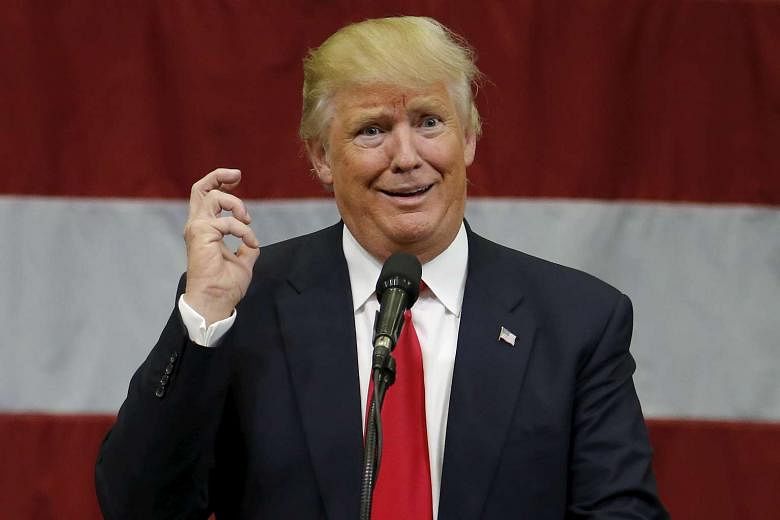In the middle of this depressing presidential campaign, I sometimes wonder, how could we make politics in the United States better?
It's possible to imagine an elite solution. The country's next president could get together with the leaders of both parties in Congress and say: "We're going to change the way we do business in Washington. We're going to deliberate and negotiate. We'll disagree and wrangle, but we will not treat this as good-versus-evil blood sport." That kind of leadership might trickle down.
But it's increasingly clear that the roots of political dysfunction lie deep in society. If there's truly going to be improvement, there has to be improvement in the social context politics is embedded in.
In healthy societies, people live their lives within a galaxy of warm places. They are members of a family, neighbourhood, school, civic organisation, hobby group, company, faith, regional culture, nation, continent and world. Each layer of life is nestled in the others to form a varied but coherent whole.
But starting just after World War II, America's community/membership mindset gave way to an individualistic/autonomy mindset. The idea was that individuals should be liberated to live as they chose, so long as they didn't interfere with the rights of others.
By 1981, the pollster Daniel Yankelovich noticed the effects: "Throughout most of this century Americans believed that self-denial made sense, sacrificing made sense, obeying the rules made sense, subordinating oneself to the institution made sense. But now doubts have set in, and Americans now believe that the old giving/getting compact needlessly restricts the individual, while advancing the power of large institutions... who use the power to enhance their own interests at the expense of the public."
The individualist turn had great effects but also accumulating downsides. By 2005, 47 per cent of Americans reported that they knew none or just a few of their neighbours by name. There's been a sharp rise in the number of people who report that they have no close friends to confide in.
Civic life has suffered. As Marc J. Dunkelman writes in his compelling book The Vanishing Neighbour, people are good at tending their inner-ring relationships - their family and friends. They're pretty good at tending to outer-ring relationships - their hundreds of Facebook acquaintances, their fellow progressives, or their TED and Harley fans.
But Americans spend less time with middle-ring township relationships - the PTA, the neighbourhood watch.
Middle-ring relationships, Dunkelman argues, help people become skilled at deliberation.
The guy sitting next to you at the volunteer fire company may have political opinions you find abhorrent, but you still have to get stuff done with him, week after week.
Middle-ring relationships also diversify the sources of identity. You might be an O'Rourke, an Irish Catholic and a professor, but you are also a citizen, importantly, of the Montrose neighbourhood in Houston.
With middle-ring memberships deteriorating, Americans have become worse at public deliberation. People find it easier to ignore inconvenient viewpoints and facts. Partisanship becomes a pre-conscious lens through which people see the world.
They report being optimistic or pessimistic, depending on whether their team is in power. They become unrealistic. People who vote for Mr Donald Trump don't seem to realise how unelectable their man is because they hang out with people like themselves.
We're good at bonding with people like ourselves but worse at bridging with people unlike ourselves. (Have you noticed that most people who call themselves "connectors" are actually excluders because they create groups restricted to people with similar status levels?)
With fewer sources of ethnic and local identity, people ask politics to fill the void. Being a Democrat or a Republican becomes their ethnicity. People put politics at the centre of their psychological, emotional and even spiritual life.
This is asking too much of politics. Once politics becomes your ethnic and moral identity, it becomes impossible to compromise, because compromise becomes dishonour.
If you put politics at the centre of identity, you end up asking the state to eclipse every social authority but itself. Presidential campaigns become these gargantuan two-year national rituals that swallow everything else in national life.
If we are going to salvage our politics, we probably have to shrink politics, and nurture the thick local membership web that politics rests within. We probably have to scale back the culture of autonomy that was appropriate for the 1960s but that has since gone too far.
If we make this cultural shift, we may even end up happier. For there is a paradox to longing. If each of us fulfils all of our discrete individual desires, we end up with a society that is not what we want at all.
The highest level of Maslow's hierarchy of needs, self-actualisation, is actually connected to the lowest level, group survival. People experience their highest joy in helping their neighbours make it through the day.
NEW YORK TIMES

